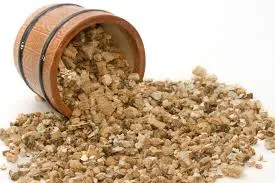Aug . 01, 2024 09:16 Back to list
Exploring the Role and Production of Vermiculite in Horticulture and Its Factories
The Role of Horticulture Vermiculite Factories in Sustainable Agriculture
Horticulture vermiculite has emerged as a crucial component in modern agricultural practices, particularly in the realm of sustainable farming. As the demand for effective growing mediums continues to rise, vermiculite factories are playing an integral role in meeting these needs. This article explores the significance of horticulture vermiculite factories, their benefits, and their impact on the agricultural landscape.
What is Vermiculite?
Vermiculite is a naturally occurring mineral that, when heated, expands into lightweight, porous granules. This expansion occurs at high temperatures, causing the mineral to exfoliate. The resulting material is ideal for various horticultural applications due to its excellent aeration, moisture retention, and nutrient-holding capabilities. It is particularly favored for seed starting, potting mixes, and as a soil amendment.
The Importance of Vermiculite in Horticulture
The horticulture industry benefits immensely from the unique properties of vermiculite. One of its primary advantages is its ability to retain moisture while providing adequate drainage. This characteristic is vital for plant health, as it ensures that roots receive the water they need without the risk of waterlogging. Furthermore, vermiculite is chemically inert, meaning it won’t alter the pH of the soil or interact negatively with fertilizers, making it a reliable choice for growers.
Vermiculite also aids in the propagation of plants. Its lightweight nature allows for easier handling and transport, while its aeration properties promote robust root growth. For horticulturists, using vermiculite can lead to healthier plants, increased yields, and reduced water usage, aligning with sustainable agricultural practices.
The Role of Factories in Production
horticulture vermiculite factories

Horticulture vermiculite factories play a pivotal role in the supply chain of this essential material. These factories extract vermiculite from natural deposits, which are then processed and expanded to create the final product used by growers. The industrial processing of vermiculite involves significant technical expertise, ensuring that the granules produced meet the specific size and quality requirements needed for horticultural applications.
Moreover, as environmental concerns rise, many vermiculite factories are adopting sustainable practices in their operations. This includes minimizing waste, utilizing eco-friendly production methods, and sourcing vermiculite from sites that follow responsible mining practices. By prioritizing sustainability, these factories contribute positively to the agricultural sector’s overall ecological footprint.
Challenges and Future Prospects
While the demand for horticulture vermiculite is on the rise, factories face challenges related to supply and environmental impact. The mining of vermiculite must be balanced with ecological preservation, and factories need to adhere to regulations that protect natural habitats. Additionally, competition from alternative growing mediums, such as coconut coir and peat moss, is intensifying.
Looking ahead, the future of horticulture vermiculite factories seems promising. Innovations in production technology and heightened awareness of sustainable practices suggest that vermiculite will continue to be a vital resource for horticulturists. As agriculture moves towards more sustainable methods, the role of these factories will be essential in ensuring that high-quality, eco-friendly growing mediums are readily available to meet the needs of modern farming.
Conclusion
In summary, horticulture vermiculite factories are key players in sustainable agriculture, providing a vital growing medium that supports plant health and contributes to efficient resource use. As the industry evolves, these factories are positioned to meet the growing needs of horticulturists while adhering to environmental sustainability principles. The commitment to responsible production will ensure that vermiculite remains a cornerstone of modern horticulture, fostering healthy plants and sustainable farming practices for generations to come.
-
Eco-Friendly Granule Covering Agent | Dust & Caking Control
NewsAug.06,2025
-
Fe-C Composite Pellets for BOF: High-Efficiency & Cost-Saving
NewsAug.05,2025
-
Premium Tundish Covering Agents Exporters | High Purity
NewsAug.04,2025
-
Fe-C Composite Pellets for BOF | Efficient & Economical
NewsAug.03,2025
-
Top Tundish Covering Agent Exporters | Premium Quality Solutions
NewsAug.02,2025
-
First Bauxite Exporters | AI-Optimized Supply
NewsAug.01,2025
